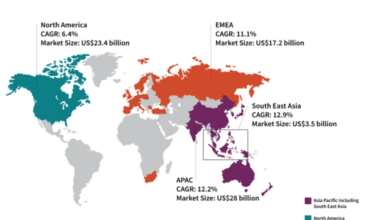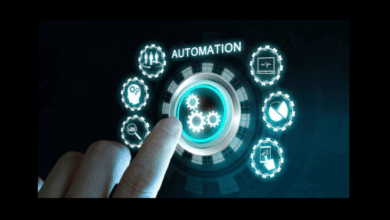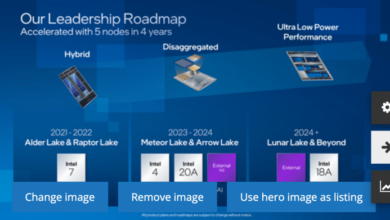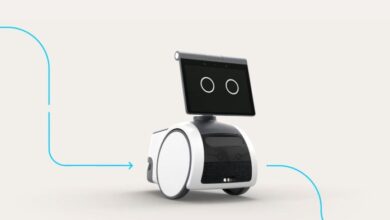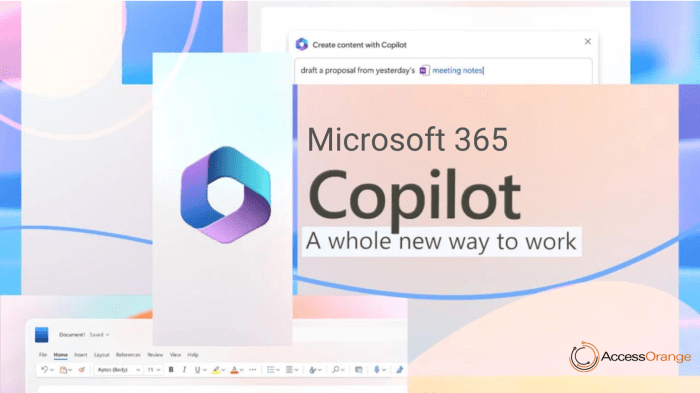
Microsoft Copilot Announced for Azure: A New Era of Development
Microsoft Copilot announced for Azure marks a significant leap forward in cloud computing and AI. This powerful new tool promises to revolutionize the way developers work, bringing automation, increased productivity, and enhanced code quality to the forefront.
Imagine a world where developers can focus on the creative aspects of coding, leaving the mundane and repetitive tasks to an intelligent assistant. That’s the promise of Microsoft Copilot, and its integration with Azure makes it even more accessible and powerful.
Microsoft Copilot for Azure: A Game Changer for Cloud Development
The integration of Microsoft Copilot with Azure marks a significant leap forward in the world of cloud computing and artificial intelligence. This announcement signifies a paradigm shift, empowering developers and businesses to leverage the power of AI to accelerate development, enhance productivity, and unlock new possibilities.
Impact on Developers
The introduction of Microsoft Copilot for Azure promises to revolutionize the way developers approach their work. Here are some key benefits:
- Enhanced Productivity:Copilot’s AI-powered capabilities can automate repetitive tasks, allowing developers to focus on more complex and creative aspects of their projects.
- Faster Development Cycles:By generating code snippets and suggesting solutions, Copilot can significantly accelerate the development process, leading to faster time-to-market for new products and features.
- Improved Code Quality:Copilot’s ability to analyze code and identify potential issues can help developers write cleaner, more efficient, and less error-prone code.
- Accessibility to New Technologies:Copilot can help developers learn and adopt new technologies by providing guidance and suggestions, even for unfamiliar domains.
Impact on Businesses
The integration of Microsoft Copilot with Azure has far-reaching implications for businesses across various industries. Here are some key benefits:
- Increased Innovation:Copilot empowers businesses to experiment with new ideas and develop innovative solutions more quickly, fostering a culture of experimentation and creativity.
- Reduced Development Costs:By automating tasks and streamlining development processes, Copilot can help businesses reduce development costs and improve their overall return on investment.
- Enhanced Competitiveness:Businesses that leverage Copilot’s capabilities can gain a competitive advantage by bringing new products and services to market faster and more efficiently.
- Improved Customer Experience:By enabling businesses to develop better and more user-friendly applications, Copilot can contribute to improved customer satisfaction and loyalty.
Impact on the Tech Landscape
The integration of Microsoft Copilot with Azure is poised to reshape the tech landscape in several ways:
- Rise of Low-Code/No-Code Development:Copilot’s AI-powered capabilities will make it easier for non-technical users to develop applications, leading to a rise in low-code/no-code development platforms.
- Increased Demand for AI Skills:As AI becomes more integrated into development workflows, there will be an increasing demand for developers with AI skills, leading to new career opportunities.
- Focus on AI-Driven Innovation:The integration of Copilot with Azure will encourage businesses and developers to focus on AI-driven innovation, leading to the development of new and exciting applications and services.
Key Features and Capabilities
Microsoft Copilot for Azure is a game-changer for cloud development, offering a comprehensive suite of AI-powered features that streamline workflows, enhance productivity, and elevate code quality. It goes beyond basic code completion, providing developers with a powerful and intelligent companion that simplifies complex tasks and accelerates development cycles.
Code Generation and Completion
Microsoft Copilot for Azure utilizes advanced AI models to generate and complete code based on context, developer intent, and existing code. It can write entire functions, implement complex algorithms, and suggest code snippets to improve efficiency and reduce errors.
Code Optimization and Refactoring
Copilot analyzes code and suggests optimizations to enhance performance, readability, and maintainability. It can refactor code, identify potential issues, and recommend best practices to improve code quality and reduce technical debt.
Security and Compliance
Copilot integrates with Azure security tools and policies, ensuring code adheres to best practices and complies with industry standards. It can identify potential vulnerabilities and recommend security fixes to enhance the overall security posture of applications.
Cloud-Native Development
Copilot excels in cloud-native development, providing developers with assistance in building and deploying applications on Azure. It understands the nuances of cloud infrastructure and offers guidance on using Azure services, frameworks, and tools effectively.
Integration with Azure Services
Copilot seamlessly integrates with various Azure services, such as Azure Functions, Azure Cosmos DB, and Azure Kubernetes Service. This integration allows developers to leverage the power of Azure services while benefiting from Copilot’s intelligent assistance.
AI Models and Technologies
Microsoft Copilot for Azure is powered by a combination of advanced AI models, including:
- Large Language Models (LLMs):These models are trained on massive datasets of code and natural language, enabling them to understand context, generate code, and provide intelligent suggestions.
- Code Transformers:These models are specifically designed for code generation and completion, leveraging deep learning techniques to analyze code patterns and predict the most relevant suggestions.
- Azure Cognitive Services:Copilot leverages Azure Cognitive Services, such as Azure OpenAI Service, to access powerful AI capabilities, including natural language understanding, code analysis, and predictive modeling.
Use Cases and Applications: Microsoft Copilot Announced For Azure
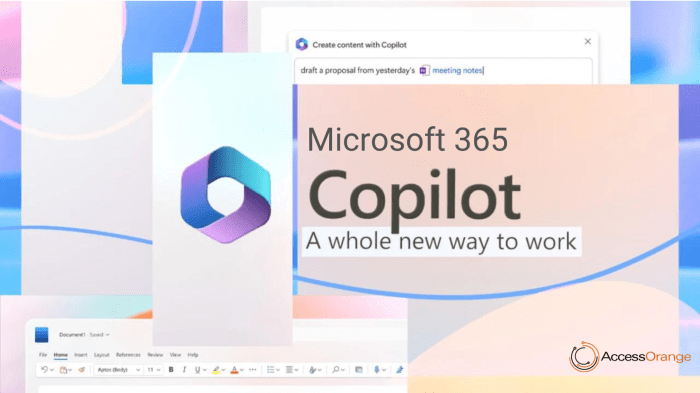
Microsoft Copilot for Azure is not just a tool; it’s a transformative force that can revolutionize the way businesses approach cloud development. By seamlessly integrating with Azure services, Copilot empowers developers and IT professionals across various industries to optimize their workflows, enhance productivity, and unlock new possibilities.
Let’s explore some real-world examples and hypothetical scenarios to understand how Copilot can be a game-changer.
Application Development
Copilot’s ability to generate code, suggest best practices, and automate repetitive tasks makes it a powerful ally for application developers. Here are some specific examples:
- Automating Infrastructure Provisioning:Copilot can automate the creation and configuration of Azure resources based on user requirements. This significantly reduces the time and effort involved in setting up infrastructure for new applications, enabling developers to focus on building the core functionality.
- Accelerating Code Development:Copilot can generate code snippets, complete code lines, and suggest relevant libraries and frameworks, making coding faster and more efficient. This is particularly beneficial for complex projects involving large codebases or unfamiliar technologies.
- Improving Code Quality:Copilot can analyze code for potential errors, security vulnerabilities, and performance bottlenecks, helping developers write cleaner, more robust code. This proactive approach ensures that applications are built with high quality and meet industry standards.
Infrastructure Management
Copilot can simplify infrastructure management by automating routine tasks, providing insights into resource utilization, and helping to identify potential issues before they escalate.Let’s imagine a scenario:
A large retail company is experiencing performance issues with its online store during peak shopping hours. Using Copilot, the IT team can analyze resource utilization data and identify bottlenecks in the infrastructure. Copilot can then recommend specific actions, such as scaling up virtual machines or optimizing database queries, to improve performance and ensure a smooth customer experience.
Data Analysis
Copilot can empower data analysts and scientists by automating data preparation tasks, generating insights from complex datasets, and creating interactive visualizations.Here are some specific examples:
- Data Cleaning and Transformation:Copilot can automate tasks like data cleansing, formatting, and transformation, saving analysts significant time and effort. This allows them to focus on analyzing the data and deriving valuable insights.
- Predictive Analytics:Copilot can help data scientists build predictive models by suggesting relevant features, algorithms, and parameters. This accelerates the model development process and enables them to create more accurate and reliable predictions.
- Interactive Data Visualization:Copilot can generate interactive visualizations based on data analysis results, making it easier to communicate insights to stakeholders. This fosters collaboration and facilitates better decision-making.
Benefits and Advantages
Microsoft Copilot for Azure offers a transformative approach to cloud development, providing significant benefits over traditional methods. It streamlines the development process, boosts efficiency, and empowers developers to focus on innovation.
Microsoft’s announcement of Copilot for Azure is exciting news for developers, promising to streamline workflows and boost productivity. But while we’re focused on the future of cloud development, it’s worth remembering that security remains paramount. A recent report highlights a potential security flaw in Apple Silicon chips , demonstrating the ongoing need for vigilance in safeguarding our data.
As we embrace new technologies like Copilot, we must also be mindful of potential vulnerabilities and ensure robust security measures are in place.
Cost Savings and Time Efficiency
Copilot’s AI-powered capabilities significantly reduce development time and costs. It automates repetitive tasks, such as code generation, infrastructure provisioning, and configuration, freeing up developers to focus on more strategic work.
- Faster Development Cycles:By automating code generation and infrastructure provisioning, Copilot accelerates development cycles, enabling faster delivery of applications and services.
- Reduced Development Costs:Automating tasks reduces the need for manual coding and infrastructure management, resulting in lower development costs.
- Improved Resource Allocation:With Copilot handling routine tasks, developers can focus on complex challenges, optimizing resource allocation and productivity.
Enhanced Accuracy and Reliability
Copilot leverages AI to analyze vast amounts of code and best practices, resulting in highly accurate and reliable code. This reduces the likelihood of errors and improves the overall quality of applications.
- Minimized Errors:Copilot’s AI-powered code generation reduces the risk of human errors, leading to more reliable and robust applications.
- Improved Code Quality:Copilot adheres to industry best practices and coding standards, ensuring high-quality and maintainable code.
- Reduced Debugging Time:By generating accurate and reliable code, Copilot minimizes debugging time, accelerating development cycles.
Innovation and Digital Transformation
Copilot empowers developers to focus on innovation by handling routine tasks, enabling them to explore new ideas and technologies. This fosters a culture of innovation and accelerates digital transformation initiatives.
- Focus on Innovation:Copilot frees developers from repetitive tasks, allowing them to focus on exploring new ideas and technologies.
- Faster Experimentation:With Copilot’s assistance, developers can experiment with new technologies and approaches more quickly, accelerating innovation.
- Enhanced Competitiveness:Copilot empowers organizations to innovate faster and adapt to changing market conditions, enhancing their competitiveness.
Increased Developer Productivity
Copilot empowers developers to work more efficiently by automating tasks and providing intelligent assistance. This leads to increased productivity and job satisfaction.
- Reduced Cognitive Load:Copilot handles routine tasks, reducing the cognitive load on developers and allowing them to focus on more complex problems.
- Improved Developer Experience:Copilot provides a seamless and intuitive development experience, enhancing developer productivity and satisfaction.
- Faster Time to Market:By accelerating development cycles, Copilot enables organizations to bring new products and services to market faster.
Improved Security
Copilot helps developers write secure code by integrating security best practices into the development process. This reduces the risk of vulnerabilities and improves the overall security of applications.
- Enhanced Security Awareness:Copilot integrates security best practices into the development process, raising awareness of security considerations.
- Reduced Vulnerabilities:Copilot’s AI-powered code analysis helps identify and mitigate potential security vulnerabilities.
- Improved Compliance:Copilot assists developers in adhering to industry security standards and regulations, ensuring compliance.
Integration with Azure Services
Microsoft Copilot for Azure is not just a standalone tool but seamlessly integrates with existing Azure services, enhancing their capabilities and creating a unified development experience. This integration unlocks a new level of efficiency and productivity for developers, streamlining the development process and accelerating cloud adoption.
Integration with Azure DevOps
The integration of Microsoft Copilot with Azure DevOps streamlines the development workflow by automating repetitive tasks and providing intelligent assistance throughout the development lifecycle.
- Copilot can generate code snippets, complete functions, and suggest improvements based on the context of the project and the developer’s input.
- It can also help with code reviews, identifying potential bugs and security vulnerabilities, and suggesting best practices.
- Copilot can even automate the creation of pull requests, ensuring that code changes are properly documented and reviewed before being merged into the main branch.
This integration reduces the time and effort required for development, allowing developers to focus on more complex and creative tasks.
Integration with Azure Functions
Copilot’s integration with Azure Functions empowers developers to create and deploy serverless applications with greater ease and speed.
Microsoft’s announcement of Copilot for Azure is huge news, especially for those of us who rely on efficient project management tools. One of the first things I’m going to explore is how Copilot can help me streamline my workflow by automatically generating tasks and updates in my SharePoint site.
Speaking of SharePoint, if you’re looking for a way to visualize your projects with a kanban board, you can learn how to create kanban board sharepoint – it’s a great way to stay organized and track progress. With Copilot’s AI capabilities integrated with Azure, I’m excited to see how this combination can further enhance project management and make our work lives easier.
- Copilot can generate code for Azure Functions based on the developer’s requirements, automatically handling the configuration and deployment process.
- It can also suggest improvements to existing code, ensuring that functions are optimized for performance and efficiency.
- Copilot can even help with debugging and troubleshooting, identifying and resolving issues quickly and efficiently.
This integration simplifies the development of serverless applications, making it accessible to developers of all skill levels.
Integration with Azure Cognitive Services
The integration of Microsoft Copilot with Azure Cognitive Services enables developers to build intelligent applications that can understand and respond to user input in a natural and intuitive way.
Microsoft’s announcement of Copilot for Azure is exciting news for developers, offering AI-powered assistance to streamline workflows and boost productivity. It’s interesting to see this happening alongside Apple’s decision to ditch web apps on iPhones, citing the Digital Markets Act as the reason, as reported here.
While Apple’s move might seem counterintuitive, it highlights the evolving landscape of app development and the growing influence of AI, which Copilot for Azure seems poised to leverage.
- Copilot can help developers integrate Azure Cognitive Services like Language Understanding (LUIS), Computer Vision, and Text Analytics into their applications.
- It can generate code that interacts with these services, making it easy to add features like natural language processing, image recognition, and sentiment analysis to applications.
- Copilot can also suggest improvements to the way these services are used, ensuring that applications are optimized for accuracy and performance.
This integration makes it easier for developers to leverage the power of AI and machine learning to build innovative and intelligent applications.
Implications for Developers and the Azure Ecosystem
The integration of Microsoft Copilot with Azure services has significant implications for developers and the overall Azure ecosystem.
- It lowers the barrier to entry for cloud development, making it accessible to a wider range of developers.
- It increases developer productivity and efficiency, allowing developers to focus on more strategic tasks.
- It accelerates the adoption of Azure services, making it the preferred platform for cloud development.
- It fosters innovation, enabling developers to build more sophisticated and intelligent applications.
Overall, the integration of Microsoft Copilot with Azure services is a game-changer for cloud development, empowering developers to build and deploy applications faster, more efficiently, and with greater ease.
Security and Privacy Considerations
Microsoft Copilot for Azure is designed with robust security and privacy measures to protect your data and ensure responsible AI practices. These measures address potential concerns related to data security, access control, and compliance with industry regulations.
Data Security and Privacy Measures
Microsoft Copilot for Azure employs a multi-layered approach to safeguard your data. This includes encryption at rest and in transit, access control mechanisms, and compliance with industry standards.
- Encryption:Data is encrypted both when stored and while being transmitted, ensuring its confidentiality even in the event of unauthorized access.
- Access Control:Strict access controls are implemented to restrict access to your data only to authorized personnel and applications.
- Compliance:Microsoft Copilot for Azure adheres to industry-standard security and privacy regulations, including GDPR, HIPAA, and SOC 2, demonstrating its commitment to responsible data handling.
Addressing Data Security Concerns
Concerns regarding data security are addressed through various measures, including:
- Data Minimization:Copilot only uses the necessary data to provide its services, minimizing the potential risk of data breaches.
- Data Retention Policies:Data is retained only for as long as required for the service’s operation and in accordance with applicable regulations.
- Auditing and Monitoring:Regular security audits and monitoring are conducted to identify and mitigate potential security vulnerabilities.
Responsible AI Practices, Microsoft copilot announced for azure
Microsoft Copilot for Azure adheres to responsible AI principles, ensuring fairness, transparency, and accountability in its operation.
- Bias Mitigation:Measures are taken to mitigate bias in the AI models used by Copilot, ensuring fairness and equitable outcomes.
- Transparency:Information about the AI models and their training data is provided to users, promoting transparency and understanding of Copilot’s capabilities.
- Accountability:Microsoft is accountable for the responsible development and deployment of Copilot, addressing any ethical concerns and ensuring its responsible use.
Future Outlook and Impact
Microsoft Copilot for Azure is poised to revolutionize the cloud computing landscape, ushering in a new era of AI-powered development and automation. Its impact will be felt across various facets of the industry, from developer productivity to the very nature of software development itself.
The Rise of AI-Powered Development Tools
The emergence of AI-powered development tools like Copilot marks a significant shift in the way software is created. These tools leverage the power of machine learning to assist developers in various tasks, including code generation, bug detection, and even security analysis.
This has the potential to significantly enhance developer productivity, enabling them to focus on higher-level tasks and deliver solutions faster.
- Increased Efficiency and Productivity:Copilot’s ability to automate repetitive tasks and provide intelligent code suggestions can dramatically boost developer productivity. By reducing the time spent on mundane coding tasks, developers can focus on more strategic and creative aspects of their work.
- Democratization of Development:AI-powered tools can make development accessible to a wider audience, including individuals with limited coding experience. Copilot can act as a “co-pilot,” assisting non-professional developers in building applications and solutions.
- Improved Code Quality and Security:AI-powered tools can analyze code for potential vulnerabilities and errors, helping developers write more secure and robust applications. This can lead to fewer bugs, improved security posture, and reduced development costs.
Future Enhancements and Integration
Microsoft is actively developing and enhancing Copilot, aiming to further integrate it into the Azure platform. Future enhancements could include:
- Enhanced Code Generation Capabilities:Copilot’s ability to generate code could be further enhanced to handle more complex tasks, including generating entire modules or even complete applications based on user specifications.
- Integration with Azure Services:Copilot could be seamlessly integrated with various Azure services, such as Azure Functions, Azure Cosmos DB, and Azure Kubernetes Service, enabling developers to easily access and leverage these services within their projects.
- Personalized Development Experiences:Copilot could learn from individual developer preferences and coding styles, providing tailored suggestions and recommendations that optimize their workflow.


